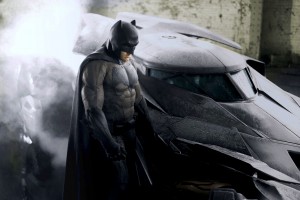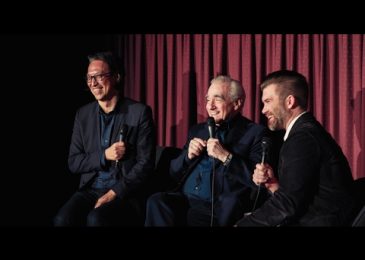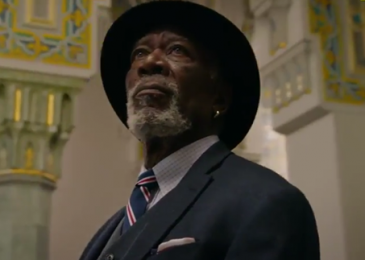OK, most of us agree that Batman v Superman: Dawn of Justice wasn’t a great movie. But it was, at times, a surprisingly thoughtful one. And with the Zack Snyder-helmed superhero flick now available on a variety of streaming services this week, it’s time to take a look at one thoughtful thread: The movie’s recurring thoughts about fatherhood—even when we’re talking about the heavenly Father.
It’s no coincidence that Christians call God our “Father,” after all. The Bible has loads of references to our creator as our Father. And according to some experts, how we feel about our own, corporeal fathers has a huge impact on how we view religion. If you have a loving, caring dad who took you to church all the time, you’ll tend to view God in the same light. Strict, taskmaster fathers tend to rear kids who have a very Old Testament view of God.
In Batman v Superman, we see that spiritual influence brought to bear in pretty significant ways. You could argue that it drives the entire story.
Consider Superman, the optimist of Batman v Superman. In Man of Steel, Snyder spends quite a bit of time with both of the superhero’s fathers: Jor-El is a distant-but-wise figure in Supes’ life—almost a God-like being who sends him to Earth and points him down the right path. “You will give the People of Earth an ideal to strive towards,” Jor-El says. “They will rice behind you, they will stumble, they will fall. But in time, they will join you in the sun, Kal. In time you will help them accomplish wonders.”

Jonathan Kent, his adopted father, was no less influential. He raised Superman—now known as Clark Kent—with his strong Midwestern values and a tireless sense of right and wrong. “You just have to decide what kind of a man you want to grow up to be, Clark; because whoever that man is, good character or bad, he’s going to change the world.” While it was slightly preposterous how and why Jonathan Kent sacrificed himself in Man of Steel, it was thematically resonant—important to the sacrificial Christ-like figure that Superman would become.
He’s very much that person in Batman v Superman—the hero who believes in justice and goodness, who has faith, both in himself and in humanity.
Batman is a much different, much darker sort of superhero here. Batman v Superman recaps his well-known origin story: Thomas and Martha Wayne, Bruce Wayne’s parents, were gunned down in an alleyway when Bruce was just a child. Their tragic death spurred Bruce to start dressing like a bat to fight crime.
And it’s clear that Bruce hasn’t gotten over it yet. In Batman v Superman, when the two heroes are at odds and beating each other to a brisket, the Dark Knight brings up their divergent upbringings and zings the Man of Steel with it
“I bet your parents taught you that you mean something, that you’re here for a reason,” he spits. “My parents taught me a different lesson, dying in the gutter for no reason at all … They taught me the world only makes sense if you force it to.”
 It may not seem like it at first blush, but this is a deeply spiritual statement. Whenever we say that we’re here for a “reason,” we’re no longer in the realm of a purely scientific worldview, wherein evolution and chance rule the world. When used like this, words like “reason” and “purpose” point to a force—a moral force—that has plans for us. That wants us to do certain things.
It may not seem like it at first blush, but this is a deeply spiritual statement. Whenever we say that we’re here for a “reason,” we’re no longer in the realm of a purely scientific worldview, wherein evolution and chance rule the world. When used like this, words like “reason” and “purpose” point to a force—a moral force—that has plans for us. That wants us to do certain things.
This Batman—as dark a Batman as we’ve seen anywhere (and a far different Batman than I’ve written about before)—rejects that sense of purpose. His father and mother are gone. And, for Batman, so is God and any sense of real, overarching meaning.
But not only do we know how pivotal dads were in Batman and Superman’s respective upbringings, we also know something about Lex Luthor’s dad. He was abusive—ruthlessly so. That abuse impacted Luthor’s view of faith. “No man in the sky intervened when I was a boy to deliver me from daddy’s fist and abominations,” he tells Superman. “I figured out way back if God is all-powerful, He cannot be all good. And if He is all good, then He cannot be all-powerful. And neither can you be.”
Luthor was helpless under the “all-powerful” force of his father. His view of God was warped by his upbringing. Without this understanding, Luthor’s abject hatred for Superman is difficult to explain—a plot hole. But with it, everything fits together. Luthor, because of his dad, can’t embrace the God of Superman—that loving, just sense of meaning. He can’t simply dismiss God, as Batman has apparently done. No, he hates God and anything—anyone—that resembles Him. For Luthor, God and the devil might as well be one. And Superman is as close to divinity as he can get.
 Over and over, Luthor refers to his arch-enemy as a being from above … or below. “Devils don’t come from hell beneath us,” he tells a senator. “No, they come from the sky.” He tells Martha Wayne, Superman’s earthly mother, that his son is a “flying demon,” and that she must therefore be a witch. He calls the conflict he manipulated between Batman and superman to be “God versus man; day versus night.” “And now God bends to my will!” he exalts. And when it appears that his plan to pit Batman against Superman has failed, he unleashes a terrible monster—an twisted abomination of another Kryptonian son. “If man won’t kill God, the Devil will do it!” he shouts.
Over and over, Luthor refers to his arch-enemy as a being from above … or below. “Devils don’t come from hell beneath us,” he tells a senator. “No, they come from the sky.” He tells Martha Wayne, Superman’s earthly mother, that his son is a “flying demon,” and that she must therefore be a witch. He calls the conflict he manipulated between Batman and superman to be “God versus man; day versus night.” “And now God bends to my will!” he exalts. And when it appears that his plan to pit Batman against Superman has failed, he unleashes a terrible monster—an twisted abomination of another Kryptonian son. “If man won’t kill God, the Devil will do it!” he shouts.
Batman v Superman is, at its core, a spiritual story, and a surprisingly psychological one. While conflicts manifest in extraordinarily muscular ways—fisticuffs and heat rays and kryptonite-tipped spears—the conflicts began in the mind. In the soul. And in the formative first days, when fathers and families taught their sons some powerful lessons—for good or for ill.





